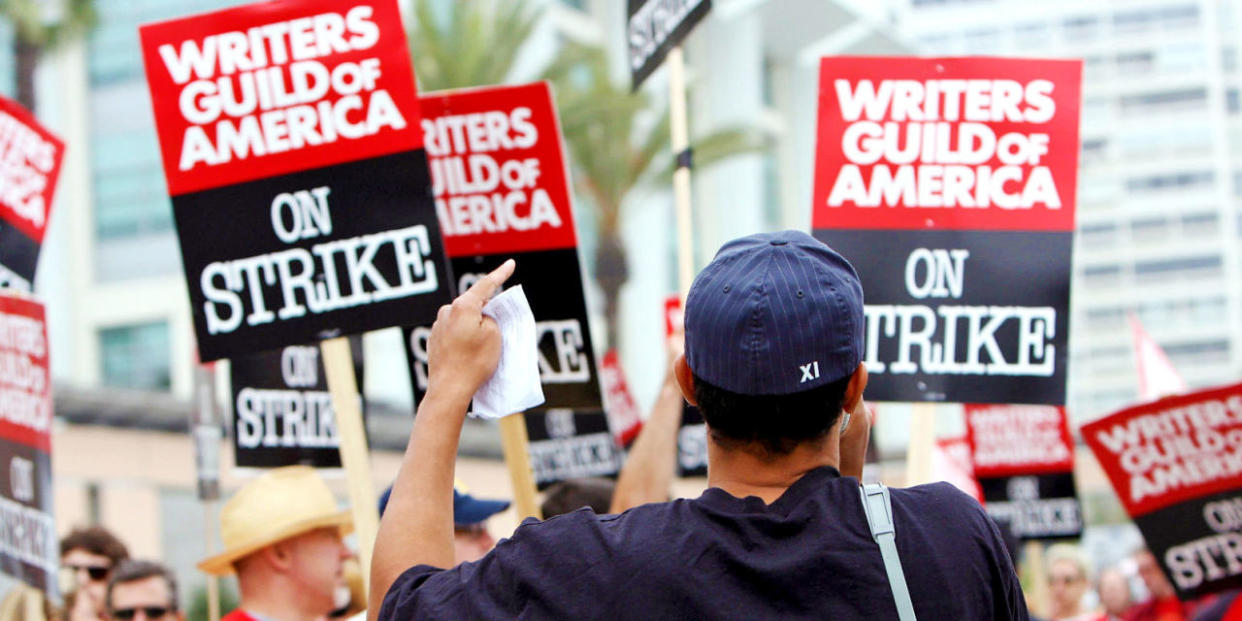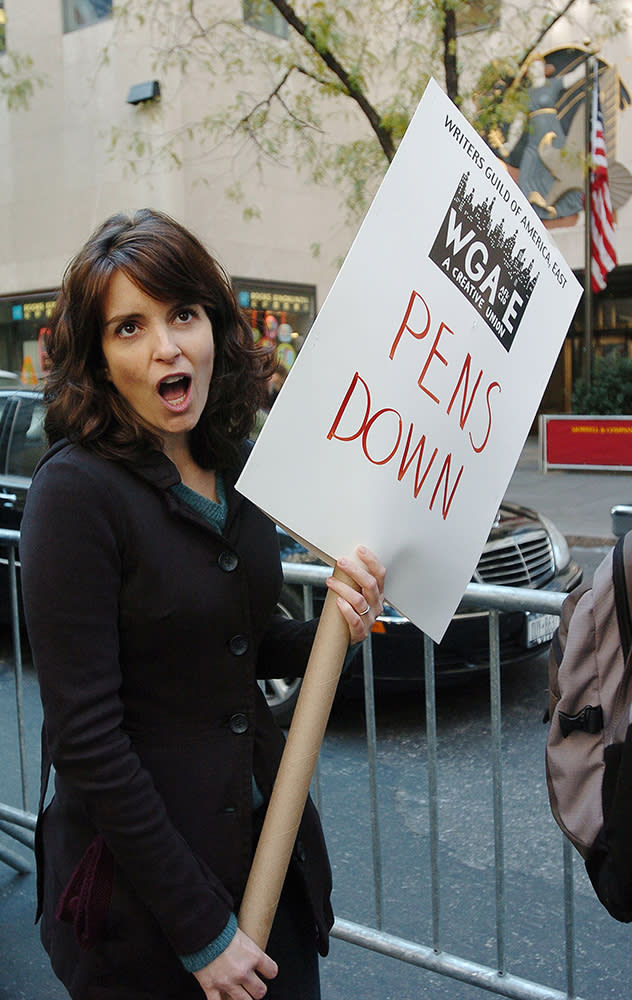Hollywood Will Not Be Going On Strike Today

UPDATE: Late in the evening on May 1, the Writers Guild of America struck a last-minute deal with the studios, avoiding a strike just before the deadline. Multiple WGA members told The Hollywood Reporter that the new three-year deal is "a good deal" had been reached for the writers. The gains made relate to the WGA health plan, pay TV residuals, and payment for short TV seasons-under the new deal, writers must be paid additional fees for any project that requires they work on a single episode for longer than 2.4 weeks. You can read more about the latter issue below.
If you thought Peak TV was wreaking havoc on your social life, spare a thought for the writers getting hit with pay-cuts as a result. The structure of writers' earnings in a changing TV era is at the core of negotiations happening in Hollywood this week, which could end with screenwriters collectively going on strike at the beginning of May.
Today, the Writers Guild of America-the union to which all working screenwriters are required to belong-will once again resume negotiations over its new contract with the Alliance of Motion Picture and Television Producers, which represents TV networks and movie studios. As yet, the parties haven't been able to agree on a deal that meets the Guild's requirements, and as of two weeks ago they weren't even close (the difference between what the studios offered and what the writers wanted was around $350 million). If a deal can't be reached by May 1, when the current contract expires, then the WGA has confirmed that it will strike.
While several issues are under discussion, one of the most pressing is the changing format of television production, and the impact of that new status quo on writers' earnings. As the Guild puts it: "In a time of unprecedented demand, TV writers are, illogically, earning less."

"In the event that we are unable to negotiate a new contract with the AMPTP, a work stoppage will begin May 2nd," the WGA said in a letter to media buyers two weeks ago, per The Hollywood Reporter. "Should this occur, writing for television, feature films, and digital series will cease."
So what exactly does this mean?
As of now, the first step towards a strike has already been taken. The WGA held its strike authorization vote yesterday (May 24), with 96.3 percent of members in favor. If a deal can't be reached, the WGA now has the authority to call a strike, which according to guild president Howard Rodman should give them some much-needed leverage in the ongoing negotiations, by forcing the studios' hand: "The companies don't want to give us a penny they don't have to. It's that simple."
If a strike happens, it will begin on May 2, when most broadcast shows are already on hiatus. Late-night shows will feel the impact immediately, and depending on how long the strike lasts, the start of the 2017-2018 TV season could be pushed back from September to October, or even further.
What's behind the strike?
While the guild's healthcare and pension plans are part of the negotiations, the major issue at stake is Peak TV, and its impact on writers. Scripted shows are being produced in higher quantities than ever before-a record-breaking 455 aired last year-but also in shorter orders than ever before.
In the traditional network TV model, an average season ran between 22 and 24 episodes long, but now more and more shows conform to the traditional cable model of 10-13 episode seasons. That's a problem for writers, who are generally paid on a per-episode basis. The production timeline on a streaming 10-episode season is not necessarily much shorter than that of a traditional 22-episode season, but writers are still required to work on them exclusively for that period, which translates to a huge drop in earnings. So while employment for TV writers has surged, their average wages dropped 21 percent in the 2010-15 period.
For its new three-year contract with the AMPTP, the WGA is seeking to increase earnings and job security for TV writers, and to bolster funding for its healthcare plan and pension benefits. Negotiations began in March, but broke down towards the end of the month.
What shows will be affected?
May is probably the least disruptive time possible for a writers' strike–most broadcast shows are already on hiatus, having wrapped production in or around March.
Late-night shows will go dark immediately in the event of a strike. During the 2007 writers strike, David Letterman ultimately reached a deal with the WGA that allowed The Late Show to return to the air after two months away. Conan O'Brien, Jon Stewart, and Stephen Colbert, meanwhile, had a memorable backstage brawl in the absence of their respective writing staffs.
The 2017 summer TV schedule won't immediately look too different, since it's mostly cable and streaming series that premiere at this time: shows like Showtime's Twin Peaks, Netflix's Orange In the New Black, and HBO's Game of Thrones are already in the can. But many other cable and streaming shows would be immediately affected–among them Netflix's Jessica Jones, CBS's Star Trek Discovery, and FX's American Horror Story, all of which are due to be either in pre-production or shooting in May.
Most network shows go back into production in July, so a strike lasting beyond the end of May would delay the start of the 2017-2018 fall TV season.
If the strike goes on for more than a month, that's when things will start to get real. Most network shows go back into production in July, with writing beginning several weeks prior, so a strike lasting beyond the end of May would delay the start of the 2017-2018 fall TV season.
Next month's network upfronts in New York, where broadcasters present their upcoming slates to potential advertisers, could also get awkward in the event of a strike, since the networks won't be able to guarantee full seasons of their scripted shows in the 2017-2018 period.
What about movies?
It's tough to tell how a theoretical strike would affect movies, and depending on how long the strike lasts, the impact could be minimal. During the last writers' strike in 2007-2008, a few blockbusters rushed to have their scripts finished before the walkout began–and the results were, predictably, not great. X-Men Origins: Wolverine is probably the most notable casualty, with Fox reportedly sending out "an urgent SOS to the major agencies looking for a quick rewrite person" in order to get Wolverine's first stand-alone movie ready for its planned May 2009 release date. Probably should've held off.

What else happened during the last writers' strike?
That strike began in November 2007, while network shows were all still in production, and lasted until the following February. The issues at hand included DVD residuals (remember when those were a thing?) and compensation for what was then dubbed "new media" content-i.e. shows written for or distributed on the internet. It's probably fair to say the WGA did well to fight for the latter.
Many of the aughts' biggest scripted shows, from House to Lost to 30 Rock, had their seasons shortened as a result of the writers' strike. A little-watched freshman cable drama called Breaking Bad had its first season cut down from nine episodes to seven. Many returning shows were able to go back and complete their seasons by shooting an additional set of episodes after the strike ended in February, while others had to make do with weird, truncated half-seasons.
A whole bunch of reality shows, meanwhile, benefited from the networks' need to fill space–The Amazing Race and Big Brother were among the shows that had additional seasons ordered as a result of the strike.
The 2007 strike cost the economy anywhere from $2.1 billion to $2.5 billion, depending on which estimate you believe. So as Breaking Bad and Better Call Saul showrunner Vince Gilligan put it to THR, "Anybody on either side of the table would be crazy to want a strike."
Does this mean I finally have time to catch up with the 74 shows on my To Watch list?
Congrats! You have found the silver lining.
UPDATE: Late in the evening on May 1, the Writers Guild of America struck a last-minute deal with the studios, avoiding a strike just before the deadline. Multiple WGA members told The Hollywood Reporter that the new three-year deal is "a good deal" had been reached for the writers. The gains made relate to the WGA health plan, pay TV residuals, and payment for short TV seasons-under the new deal, writers must be paid additional fees for any project that requires they work on a single episode for longer than 2.4 weeks. You can read more about the latter issue below.
If you thought Peak TV was wreaking havoc on your social life, spare a thought for the writers getting hit with pay-cuts as a result. The structure of writers' earnings in a changing TV era is at the core of negotiations happening in Hollywood this week, which could end with screenwriters collectively going on strike at the beginning of May.
Today, the Writers Guild of America-the union to which all working screenwriters are required to belong-will once again resume negotiations over its new contract with the Alliance of Motion Picture and Television Producers, which represents TV networks and movie studios. As yet, the parties haven't been able to agree on a deal that meets the Guild's requirements, and as of two weeks ago they weren't even close (the difference between what the studios offered and what the writers wanted was around $350 million). If a deal can't be reached by May 1, when the current contract expires, then the WGA has confirmed that it will strike.
While several issues are under discussion, one of the most pressing is the changing format of television production, and the impact of that new status quo on writers' earnings. As the Guild puts it: "In a time of unprecedented demand, TV writers are, illogically, earning less."

"In the event that we are unable to negotiate a new contract with the AMPTP, a work stoppage will begin May 2nd," the WGA said in a letter to media buyers two weeks ago, per The Hollywood Reporter. "Should this occur, writing for television, feature films, and digital series will cease."
So what exactly does this mean?
As of now, the first step towards a strike has already been taken. The WGA held its strike authorization vote yesterday (May 24), with 96.3 percent of members in favor. If a deal can't be reached, the WGA now has the authority to call a strike, which according to guild president Howard Rodman should give them some much-needed leverage in the ongoing negotiations, by forcing the studios' hand: "The companies don't want to give us a penny they don't have to. It's that simple."
If a strike happens, it will begin on May 2, when most broadcast shows are already on hiatus. Late-night shows will feel the impact immediately, and depending on how long the strike lasts, the start of the 2017-2018 TV season could be pushed back from September to October, or even further.
What's behind the strike?
While the guild's healthcare and pension plans are part of the negotiations, the major issue at stake is Peak TV, and its impact on writers. Scripted shows are being produced in higher quantities than ever before-a record-breaking 455 aired last year-but also in shorter orders than ever before.
In the traditional network TV model, an average season ran between 22 and 24 episodes long, but now more and more shows conform to the traditional cable model of 10-13 episode seasons. That's a problem for writers, who are generally paid on a per-episode basis. The production timeline on a streaming 10-episode season is not necessarily much shorter than that of a traditional 22-episode season, but writers are still required to work on them exclusively for that period, which translates to a huge drop in earnings. So while employment for TV writers has surged, their average wages dropped 21 percent in the 2010-15 period.
For its new three-year contract with the AMPTP, the WGA is seeking to increase earnings and job security for TV writers, and to bolster funding for its healthcare plan and pension benefits. Negotiations began in March, but broke down towards the end of the month.
What shows will be affected?
May is probably the least disruptive time possible for a writers' strike–most broadcast shows are already on hiatus, having wrapped production in or around March.
Late-night shows will go dark immediately in the event of a strike. During the 2007 writers strike, David Letterman ultimately reached a deal with the WGA that allowed The Late Show to return to the air after two months away. Conan O'Brien, Jon Stewart, and Stephen Colbert, meanwhile, had a memorable backstage brawl in the absence of their respective writing staffs.
The 2017 summer TV schedule won't immediately look too different, since it's mostly cable and streaming series that premiere at this time: shows like Showtime's Twin Peaks, Netflix's Orange In the New Black, and HBO's Game of Thrones are already in the can. But many other cable and streaming shows would be immediately affected–among them Netflix's Jessica Jones, CBS's Star Trek Discovery, and FX's American Horror Story, all of which are due to be either in pre-production or shooting in May.
Most network shows go back into production in July, so a strike lasting beyond the end of May would delay the start of the 2017-2018 fall TV season.
If the strike goes on for more than a month, that's when things will start to get real. Most network shows go back into production in July, with writing beginning several weeks prior, so a strike lasting beyond the end of May would delay the start of the 2017-2018 fall TV season.
Next month's network upfronts in New York, where broadcasters present their upcoming slates to potential advertisers, could also get awkward in the event of a strike, since the networks won't be able to guarantee full seasons of their scripted shows in the 2017-2018 period.
What about movies?
It's tough to tell how a theoretical strike would affect movies, and depending on how long the strike lasts, the impact could be minimal. During the last writers' strike in 2007-2008, a few blockbusters rushed to have their scripts finished before the walkout began–and the results were, predictably, not great. X-Men Origins: Wolverine is probably the most notable casualty, with Fox reportedly sending out "an urgent SOS to the major agencies looking for a quick rewrite person" in order to get Wolverine's first stand-alone movie ready for its planned May 2009 release date. Probably should've held off.

What else happened during the last writers' strike?
That strike began in November 2007, while network shows were all still in production, and lasted until the following February. The issues at hand included DVD residuals (remember when those were a thing?) and compensation for what was then dubbed "new media" content-i.e. shows written for or distributed on the internet. It's probably fair to say the WGA did well to fight for the latter.
Many of the aughts' biggest scripted shows, from House to Lost to 30 Rock, had their seasons shortened as a result of the writers' strike. A little-watched freshman cable drama called Breaking Bad had its first season cut down from nine episodes to seven. Many returning shows were able to go back and complete their seasons by shooting an additional set of episodes after the strike ended in February, while others had to make do with weird, truncated half-seasons.
A whole bunch of reality shows, meanwhile, benefited from the networks' need to fill space–The Amazing Race and Big Brother were among the shows that had additional seasons ordered as a result of the strike.
The 2007 strike cost the economy anywhere from $2.1 billion to $2.5 billion, depending on which estimate you believe. So as Breaking Bad and Better Call Saul showrunner Vince Gilligan put it to THR, "Anybody on either side of the table would be crazy to want a strike."
Does this mean I finally have time to catch up with the 74 shows on my To Watch list?
Congrats! You have found the silver lining.
You Might Also Like

